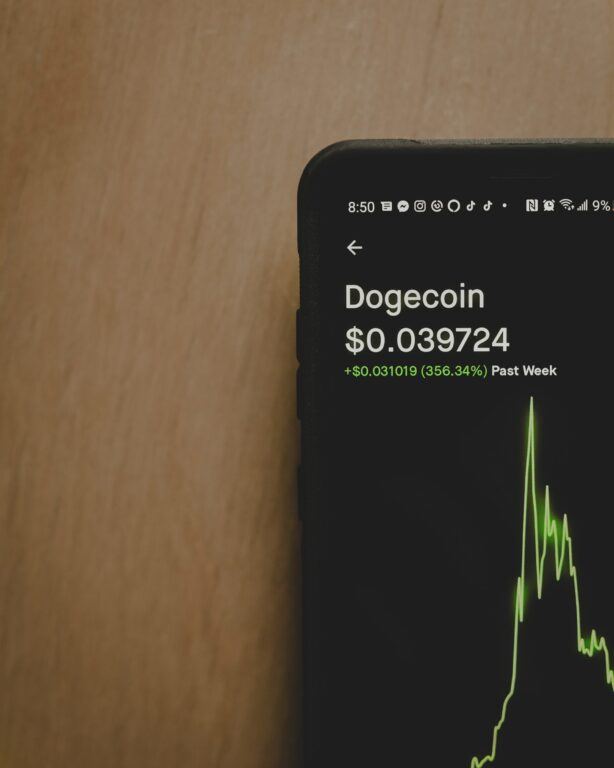Dogecoin ($DOGE) is probably the most famous meme-inspired cryptocurrency, both in the crypto world and outside of it, mostly thanks to the endorsement of various celebrities, including Elon Musk. But where did the price of DOGE start at?
DOGE started as a memecoin in 2013 —a joke to make fun of speculative coins and the cryptocurrency industry as a whole (and how people got into crypto without knowing the basics of a coin.) But what started as satire became one of the top cryptocurrencies by market capitalization —over $9 billion as of December 2022, thanks to an explosion in search interest for it.
Dogecoin’s Price in 2013: Original Price
DOGE’s original price in December 2013 went from $0 to $0.0004 in the first days of trading. In the first two weeks, the coin saw a massive upward spike, jumping 300% after China prohibited banks from dealing with cryptocurrency.
The price of DOGE fell abruptly to $0.0003 again at the end of the year and floated around those levels until January 2014.
Dogecoin in 2014: Outperforming The Market
Dogecoin’s trading volume soon saw another massive spike in January 2014, outperforming Bitcoin, Ethereum, and the entire crypto market, reaching a price of $0.0020, or another a thousand-percent increase.
During that time, the coin remained popular in the underground niches of the crypto world. It quickly developed its own community in 2014. Dogecoin didn’t have a lot of use cases besides speculative trading, as it didn’t even have a whitepaper at the time.
It soon started attracting more people following the creation of DogeTipBot, a micro-tipping service allowing users to tip for online services, and could be redeemed for other cryptocurrencies. This service opened the door for broader adoption (although small), including non-crypto people.
DOGE was then used by its community to donate over $170,000 worth of DOGE to charity. One of these donations went to the Jamaican bobsled team to help them compete at the Sochi Winter Olympic games.
DOGE’s lowest price since its creation came in early 2015; the coin had lost the community’s interest, reaching $0.0000869.
Dogecoin’s Price in 2017 – 2019: New All-Time Highs
DOGE didn’t see another significant spike in trading volume until March 2017, when the coin surged 1,500%, reaching $0.0042, a new all-time high for the memecoin.
In January 2018, DOGE peaked again, this time spreading FOMO as it reached a price of $0.018. But 2018’s crypto crash was lurking. Fast forward to the summer of 2019, the DOGE community cherished the moment when Binance finally listed the coin. Due to the aftermath of 2018’s crash and the overall industry losing 80% of its market capitalization, DOGE had the same fate as other digital assets, and the coin remained flat until 2020.
Dogecoin 2020 – 2021: Elon Enters the Game
Elon Musk marked a before and after for Dogecoin (and the whole market as well). Musk has been a prominent supporter of Dogecoin since early 2021. His statements about the coin through social media and television catapulted the coin over 400% in January, reaching a price of $0.32.
Musk took a step further by stating that he will work with Dogecoin developers to enhance certain coin features, mainly, transaction speed and infrastructure efficiency. He also talked about the possibility of SpaceX, Musk’s spacecraft manufacturer, accepting DOGE as payment for merchandise.
During the first months of 2021, DOGE traded between $0.32 and $0.34. By May, it saw its biggest price increase, surging nearly 10,000%, reaching $0.74. The fear of missing out (FOMO) was taking over the mainstream and the crypto community, leading people to put their money —and even life savings— into the meme-inspired coin to hopefully reap rewards.
Dogecoin, naturally, wasn’t deemed appropriate for the institutional giants and hedge funds who were rather exploring Bitcoin and Ethereum, launching exchange-traded funds (ETFs) and trading desks for private clients.
The endorsement was mostly coming from celebrities and influencers. The effect of opinion leaders has a major effect on products, companies, assets, and cryptocurrencies.
Influencer marketing can be a dangerous double-edged sword. It’s known that 80% of consumers are more likely to purchase something if a renowned individual promotes or talks about the product. This, of course, led to some controversial takes that Musk was pumping DOGE to his benefit. In mid-2022, a group of investors sued Musk, stating that he and his companies were deliberately inflating the price of DOGE. The lawsuit expanded in September, now being sued for $258 billion in damages.
Dogecoin’s Price Nowadays
DOGE is at the time of writing down 89% from its all-time high, trading at $0.0744 and with a circulating supply of approximately 132 billion coins.
DOGE, like all cryptocurrencies, went down together with the overall crypto market at the beginning of 2022, catapulted by the TerraUSD collapse and, months later, the FTX meltdown. In December, Dogecoin’s market cap surpassed Coinbase, which had a market cap of $8 billion, while Dogecoin had $9 billion.
Final Thoughts
What started as a joke is now a $9 billion market-cap cryptocurrency, loved by many and proportionally hated by others as well.
We could see a major price spike for Dogecoin if Space X and other companies start accepting the coin as a means of payment. However, certain issues are pending, like low transaction speed and low scalability, which is a typical problem of PoW-based blockchains.
FAQ
Is Dogecoin a Worth Investing In?
No investment is safe, and the worthiness will depend on the trader/investor. Users should only invest what they can afford to lose. If you are unsure about the suitability of your investment seek professional advice.
Who Created Dogecoin?
Billy Markus and Jackson Palmer are the founders and developers of Dogecoin, an open-source cryptocurrency project with an unlimited supply. Its blockchain infrastructure was derived from Litecoin, a cryptocurrency born as a fork in the Bitcoin blockchain in 2011.
Where Can I Trade DOGE?
DOGE can be traded in almost all crypto exchanges, like Binance, Kraken, Huobi, and Coinbase. Certain traditional exchanges also support the token, including Robinhood and eToro.
Image Source
Featured image via Unsplash.









